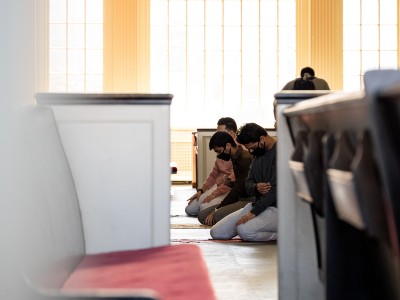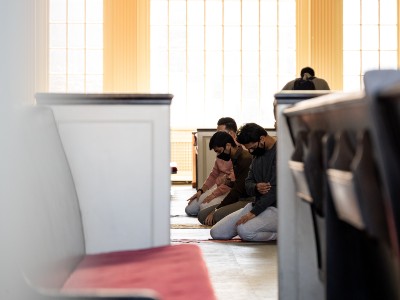Muslim Students’ Association and Muslim Chaplaincy Support Students During Ramadan 2021
Ramadan falls on the ninth month of the Islamic calendar and is an important time of reflection and empathy for observant Muslims.
This year, Ramadan lasted from April 12 through May 12, and for the first time in almost 15 years, the month of Ramadan occurred during an academic semester. The Muslim Students’ Association (MSA) and Muslim chaplaincy at Syracuse University provided students with a sense of community and support during their 30 days of fasting.
 “There is a strong emotional sentiment that comes with fasting, and at the end of fasting we always look forward to celebrating with our family for Eid. It was hard being away from our families during Ramadan, especially for international students,” says Saad Sayed G’21, MSA chief strategist. “MSA believes that coming together to support each other is what we needed the most during this sacred time.”
“There is a strong emotional sentiment that comes with fasting, and at the end of fasting we always look forward to celebrating with our family for Eid. It was hard being away from our families during Ramadan, especially for international students,” says Saad Sayed G’21, MSA chief strategist. “MSA believes that coming together to support each other is what we needed the most during this sacred time.”
During Ramadan, observant Muslims fast from dawn to dusk, abstaining from food and drink. Fasting concludes at the end of the month with the celebration of Eid. In support of participating students, the MSA organized small-scale meals, called iftars, on Fridays in Hendricks Chapel. Syracuse University Food Services helped to prepare boxed takeout meals for participants.
“Fasting during Ramadan gives individuals a heightened understanding and consciousness for those in need. Zakat, one of the Five Pillars of Islam, represents the mandatory ‘purification of possessions’ once a year,” says Amir Duric, Muslim chaplain at Hendricks Chapel. “While this type of charity can be practiced anytime, it is believed that there is a more significant spiritual reward for doing it during Ramadan.”
Another form of charity is Zakat al-Fitr, which is given specifically during Ramadan. Zakat al-Fitr represents “purification of fast,” and reminds worshippers to make a difference in the lives of those who may not have the resources to celebrate at the end of fasting.
“After about 15 hours of no food or drink, you feel really hungry and thirsty, which heightens your sensitivity to what is going on around you and in the world. That’s why in general people are giving more in Ramadan,” says Duric. “Our Friday iftars would not be possible without charity and support from others. Individuals were willing to help out to support their fellow students through volunteering their time and efforts to organize iftars every week.”
MSA members also put together goodie bags to give out to students during Ramadan, working together to ensure a collective sense of belonging. Goodie bags included small items with special meaning and snacks. The Muslim Chaplaincy has also held Taraweeh prayer every night in Hendricks Chapel during Ramadan to bring students together.
On May 13, Muslims around the world celebrated the completion of the month of Ramadan with the holiday known as Eid al-Fitr. “It is considered a day of reward for their submission, self-discipline and intensified obedience to God Almighty during Ramadan,” says Duric.
This celebration, also called the Festival of Fast-Breaking, begins with special morning prayers on the first day of Shawwal, the month following Ramadan in the Islamic lunar calendar, and lasts three days. It is a time of celebration, reflection, family reunion, sharing meals, giving charity and exchanging gifts.
The Muslim Chaplaincy and MSA organized a morning Eid prayer in Hendricks Chapel to provide a space where students could connect with their Muslim community. After the service, students had the opportunity to grab breakfast and a beverage from People’s Place Café and celebrate Eid with their peers.
“To my knowledge, this is the first time that we had an Eid service on campus. I originally wasn’t expecting any demand for a celebration, but it was requested by students. I am grateful that we were able to offer a celebration for students who were not able to be around their families during this time,” says Duric.
“Despite challenges, we made the best out of Ramadan on campus this year. We are happy that the University gave us the opportunity to carry out our plans and bring them to fruition,” says Sayed.
This story was written by Whitney Welbaum ’23
For more info, Click Here.


